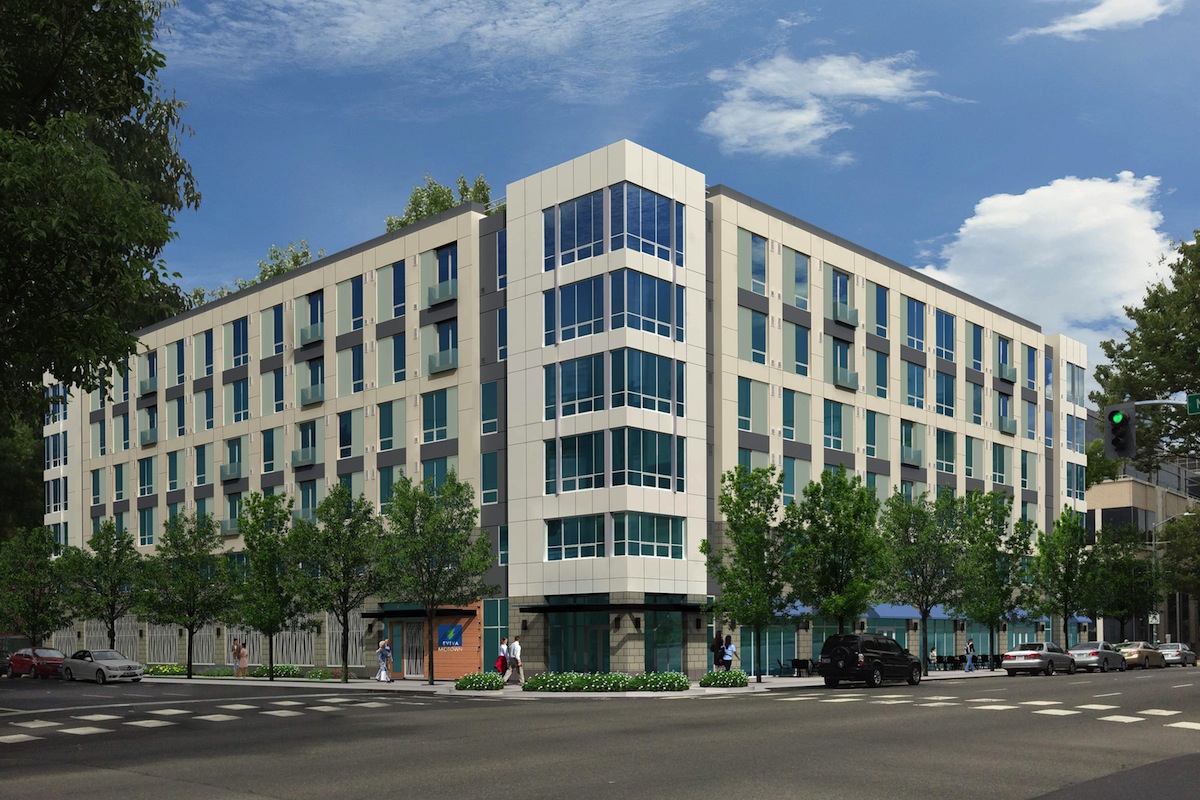This month, Guerdon Modular Buildings, a leading manufacturer of modular housing for the western U.S. and Canada, will start factory construction of modules for Eviva Midtown, a six-story apartment building in downtown Sacramento, Calif., that will have 118 condominium-style one- and two -bedroom rental units, ranging from 700 to 1,200 sf.
Guerdon took over as the module supplier for this project when its developer, Integral Development, decided to switch manufacturers once the previous modular subcontractor encountered planning and scheduling problems soon after the project’s groundbreaking in September 2014.
Eviva Downtown, which was once called The Warren, had been in development for nearly a decade before that groundbreaking. “Eviva is a chance for our deep bench of design, engineering, and construction professionals to demonstrate how our modular construction technology dramatically speeds the build process over traditional on-site approaches without any sacrifice to design or aesthetics,” says Curtis Fletcher, Guerdon’s business development manager.
This building, Sacramento’s largest modular project to date, was initiated by the Capital Area Development Authority (CADA). Integral developed this project in partnership with Sacramento-based investment firm LDK Ventures. Tricorp Hearn Construction is the GC.
During the delay caused by the modular musical chairs, Integral and CADA revisited their plans for this project and made a number of modifications and structural changes to its design. To make it more distinct from neighboring buildings, they widened Eviva’s balconies, made its corners slightly taller than the rest of the project, and added a broader color palette.
The building team chose Guerdon because its reputation for handling large-scale projects and completing modules on time.
“Guerdon has integrated so closely with our staff that every aspect of the construction process has been worry-free, from the design and build to mapping out the delivery and installation,” says Dave Bruss, chief operations officer at Tricorp Hearn, which is based in Sacramento. On-site module installation is scheduled to begin in August.
Located on the corner of 16th and N Streets, Eviva is part of an ongoing revival of Sacramento’s downtown area. For example, the $31 million renovation and restoration of the city’s 89-year-old, 68,000-sf Sacramento Valley Station—the busiest Amtrak depot west of Chicago—is one of the centerpieces of a large downtown redevelopment, which includes a Sacramento Entertainment and Sports Complex accompanied by a 16-story mixed-use hotel, retail, and residential complex designed by Los Angeles-based Rios Clementi Hale Studios. AECOM is the lead architect for the arena, which is scheduled to open October 2016, according to The Architects Newspaper.
Related Stories
MFPRO+ News | Jun 3, 2024
Seattle mayor wants to scale back energy code to spur more housing construction
Seattle’s mayor recently proposed that the city scale back a scheduled revamping of its building energy code to help boost housing production. The proposal would halt an update to the city’s multifamily and commercial building energy code that is scheduled to take effect later this year.
Resiliency | Jun 3, 2024
Houston’s buyout program has prevented flood damage but many more homes at risk
Recent flooding in Houston has increased focus on a 30-year-old program to buy out some of the area’s most vulnerable homes. Storms dropped 23 inches of rain on parts of southeast Texas, leading to thousands of homes being flooded in low-lying neighborhoods around Houston.
MFPRO+ New Projects | May 29, 2024
Two San Francisco multifamily high rises install onsite water recycling systems
Two high-rise apartment buildings in San Francisco have installed onsite water recycling systems that will reuse a total of 3.9 million gallons of wastewater annually. The recycled water will be used for toilet flushing, cooling towers, and landscape irrigation to significantly reduce water usage in both buildings.
MFPRO+ News | May 28, 2024
ENERGY STAR NextGen Certification for New Homes and Apartments launched
The U.S. Environmental Protection Agency recently launched ENERGY STAR NextGen Certified Homes and Apartments, a voluntary certification program for new residential buildings. The program will increase national energy and emissions savings by accelerating the building industry’s adoption of advanced, energy-efficient technologies, according to an EPA news release.
MFPRO+ News | May 24, 2024
Austin, Texas, outlaws windowless bedrooms
Austin, Texas will no longer allow developers to build windowless bedrooms. For at least two decades, the city had permitted developers to build thousands of windowless bedrooms.
Mass Timber | May 22, 2024
3 mass timber architecture innovations
As mass timber construction evolves from the first decade of projects, we're finding an increasing variety of mass timber solutions. Here are three primary examples.
Mixed-Use | May 22, 2024
Multifamily properties above ground-floor grocers continue to see positive rental premiums
Optimizing land usage is becoming an even bigger priority for developers. In some city centers, many large grocery stores sprawl across valuable land.
MFPRO+ News | May 21, 2024
Massachusetts governor launches advocacy group to push for more housing
Massachusetts’ Gov. Maura Healey and Lt. Gov. Kim Driscoll have taken the unusual step of setting up a nonprofit to advocate for pro-housing efforts at the local level. One Commonwealth Inc., will work to provide political and financial support for local housing initiatives, a key pillar of the governor’s agenda.
MFPRO+ News | May 21, 2024
Baker Barrios Architects announces new leadership roles for multifamily, healthcare design
Baker Barrios Architects announced two new additions to its leadership: Chris Powers, RA, AIA, NCARB, EDAC, as Associate Principal and Director (Healthcare); and Mark Kluemper, AIA, NCARB, as Associate Principal and Technical Director (Multifamily).
MFPRO+ News | May 20, 2024
Florida condo market roiled by structural safety standards law
A Florida law enacted after the Surfside condo tower collapse is causing turmoil in the condominium market. The law, which requires buildings to meet certain structural safety standards, is forcing condo associations to assess hefty fees to make repairs on older properties. In some cases, the cost per unit runs into six figures.

















